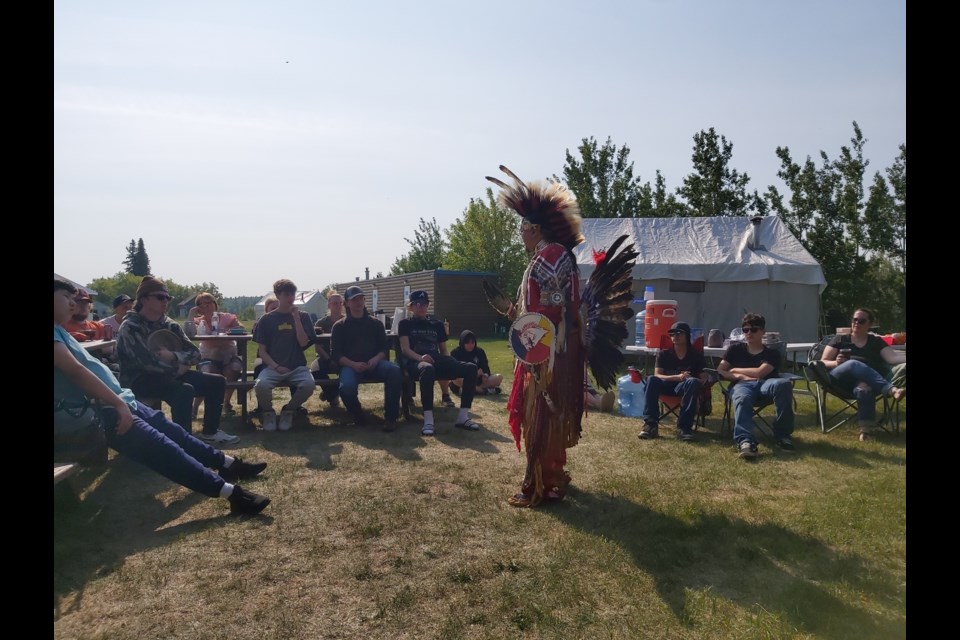BARRHEAD – Students from across the Pembina Hills School Division had what some described as life-changing experiences during a three-day Land-Based Learning Camp at Métis Crossing earlier this summer.
Deputy superintendent Raime Drake shared highlights from the June 3–5 camp at the division’s June 25 board meeting, describing the event as something far more profound than a typical field trip.
“To be witness to some pretty life-changing experiences for students is something that I can't put into words,” said Drake. “I'll try my best to give you a picture.”
Drake emphasized that the camp was intentionally designed so land-based learning would be recognized as a valued and credible form of education.
“I just wanted to acknowledge we could not have done this without our partnerships,” she said.
The impact on students was evident in their reflections.
“One student said they had been lost but now they found their path,” Drake said. “Another student said thank you for seeing me, for planning for me.”
Those powerful words resonated deeply with trustees and staff in the room.
At the end of the camp, students took part in a group reflection exercise.
“I didn't speak up more because I always second-guessed myself. I don't think that my opinions or my thoughts are valued," one participant told Drake. That same student said the camp experience made them feel safe and respected enough to share what was on their mind.
Drake said the experience also changed her personally. She returned from the camp overwhelmed and moved by what she had seen and heard.
She is now exploring how to expand land-based learning beyond the camp setting and incorporate its principles more widely across schools in the division.
Her team’s goals included helping students form cultural connections, foster environmental stewardship, and develop practical skills, leadership, and teamwork. They also wanted to give students space to reflect on their identity and well-being—objectives that were overwhelmingly achieved, Drake said.
Among the camp leaders was Cheryl Devon, one of the knowledge workers who introduced students to an Indigenous learning framework based on kishkayhta talk, a traditional method of learning and knowing.
The approach emphasizes holistic, student-centred education and values storytelling, oral tradition, reciprocity, and respect. These principles helped bond the group throughout the experience.
Devon was cooking Moose Stew and Bannock when students arrived. The food preparation created a “soft entry” into the camp, giving everyone a chance to ease into the experience together.
Students also participated in a smudging ceremony and opened in circle, where each person had an opportunity to share their intentions.
“Everybody has their own teachings, their own gifts, their own way of knowing,” said Devon. “Sharing the knowledge was welcomed.”
Craft activities such as fish scale art, beading, and hide tanning were among the many hands-on experiences offered.
Dennis McDonald from R.F. Staples brought his drum and woke the camp each morning with his songs. Jason Bigcharles, another knowledge worker, honoured McDonald by inviting him to play while Bigcharles danced in full powwow regalia, sharing a story through his performance.
Nineteen students attended the camp after first meeting during a first aid training session. They came from various schools in the division, including Swan Hills, Barrhead Composite High School, Barrhead and Westlock Outreach, and R.F. Staples.
Seven staff members accompanied the students, preparing meals, handling night checks, and fully participating in the programming. Everyone went by first names to build mutual respect and connection.
Despite the cold nighttime temperatures, the group received special permission to build fires in trapper tents during a provincewide fire ban. Students were taught how to safely build their own fires and were expected to fully engage in the spirit- and heart-filled learning.
Reflections also touched on environmental responsibility, with discussions about minimizing personal and collective ecological footprints.
Under the guiding value of reciprocity, students learned from elders and knowledge holders through conversations and active participation in cultural activities.
Students received high school credits for their involvement, but not simply for attending.
“Students did not just get the credits because they showed up," Drake said.


.jpg;w=120;h=80;mode=crop)
